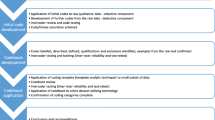Abstract
For conducting practice oriented research different research strategies are available. In this paper a typology is developed for differentiating between practice oriented research strategies that are data based and participatory research strategies. The former category involves quantitative and qualitative data based research strategies. The latter category, participatory research strategies, includes knowledge based research and practice based research. At present, methodological criteria for assessing the quality of practice oriented research heavily rely on those developed for theory oriented research, in particular internal and external validity and reliability. However, we argue that for assessing the results of practice oriented research other criteria are necessary. In this paper, methodological criteria are formulated for evaluating the internal validity and practical utility of practice oriented research with the help of a Delphi study using research methodologists as experts. They agree upon the criteria of verifiability, comprehensibility and acceptance of the results, as well as holism. Moreover, different categories of participatory and data based research strategies are compared to these criteria. Practice based research and qualitative data based research are best equipped to fulfill these criteria. These findings may enable researchers to make a more deliberate choice for a specific research strategy in practice oriented research.
Similar content being viewed by others
References
Andersen D.F., Richardson G.P.: Scripts for group model building. Syst. Dynam. Rev. 13, 107–129 (1997)
Barlas Y.: Multiple tests for validation of system dynamics type of simulation models. EJOR 42, 59–87 (1989)
Cook T.D., Campbell D.T.: Quasi-experimentation: design & analysis issues for field settings. Houghton Mifflin, Boston (1979)
Corbin J., Strauss A.: Basics of qualitative research, 3rd edn. Sage, Thousand Oaks (2008)
Dillman D.A.: Mail and internet surveys: the tailored design method, 2nd edn. Wiley, New York (2000)
Duke R.D.: Gaming: the future’s language. Sage, Beverly Hills (1974)
Eden C.: A framework for thinking about Group Decision Support Systems (GDSS). Group Decis Negot 1, 199–218 (1992)
Forrester J.W., Senge P.M.: Tests for building confidence in system dynamics models. In: Legasto, A.A., Forrester, J.W., Lyneis, J.M. (eds) System dynamics, TIMS studies in management sciences, vol. 14, pp. 209–228. North-Holland Publishing, New York (1980)
Geurts J.L.A., Joldersma C.: Methodology for participatory policy analysis. EJOR 128, 300–310 (2001)
Janis I.: Group think: psychological studies of policy decisions and fiascoes, 2nd edn. Houghton Mifflin, Boston (1982)
Janis I., Mann L.: Decision-making: a psychological analysis of conflict, choice and commitment. The Free Press, New York (1977)
Kendall M.G.: Rank correlation methods 4th ed. Griffin, London (1970)
Mayer I., de Jong M.: Combining GDSS and gaming for decision support. Group Decis Negot 13, 223–241 (2004)
Nonaka I.: A dynamic theory of organizational knowledge creation. Organ Sci. 5, 14–37 (1994)
Nunnally J.C., Bernstein I.H.: Psychometric theory, 3rd edn. McGraw-Hill, New York (1994)
Rescher N.: Predicting the future. State University of New York Press, Albany (1998)
Rouwette E.A.J.A., Vennix J.A.M., Felling A.J.A.: On evaluating the performance of problem structuring methods: an attempt at formulating a conceptual model. Group Decis Negot 18, 567–587 (2009)
Rouwette E.: Group model building as mutual persuasion. Wolf legal publishers, Nijmegen (2003)
Sterman J.: Business dynamics; systems thinking and modeling for a Complex World. McGrawHill, Boston (2000)
van Dijk J.: Popularising delphi method. Developing an instrument to control technological change for employees. Qual. Quant. 23, 189–203 (1989)
van Dijk J.: Methods in applied social research: special characteristics and quality standards. Qual. Quant. 20, 357–370 (1986)
Vennix J.A.M.: Group model building: facilitating team learning using system dynamics. Wiley, Chichester (1996)
Verschuren P.: Praktijkgericht onderzoek. Ontwerp van organisatie- en beleidsonderzoek. Boom Academic, Amsterdam (2009)
Verschuren P., Hartog R.: Evaluation in design-oriented research. Qual. Quant. 39, 733–762 (2005)
Vissers G., Heyne G., Peters V., Geurts J.: The validity of laboratory research in social and behavioral science. Qual. Quant. 35, 129–145 (2001)
Yin R.K.: Case study research; design and methods, 3rd edn. Sage, Thousand Oaks (2003)
Author information
Authors and Affiliations
Corresponding author
Rights and permissions
About this article
Cite this article
Bleijenbergh, I., Korzilius, H. & Verschuren, P. Methodological criteria for the internal validity and utility of practice oriented research. Qual Quant 45, 145–156 (2011). https://doi.org/10.1007/s11135-010-9361-5
Published:
Issue Date:
DOI: https://doi.org/10.1007/s11135-010-9361-5




